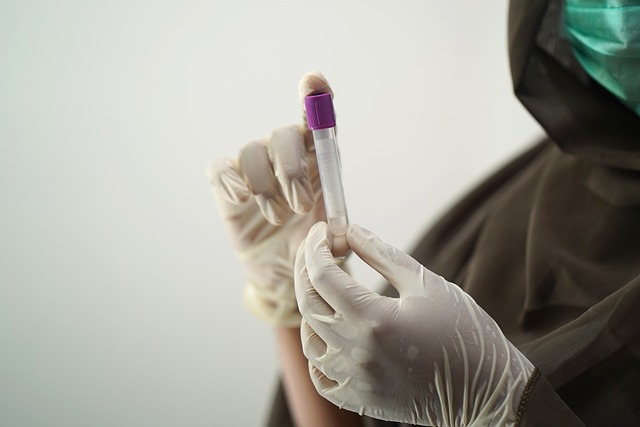The UK General Health Blood Test includes Vitamin D assessment as a critical component for overall health management. Vitamin D, known as the 'sunshine vitamin,' is essential for bone maintenance by regulating calcium levels and increasing bone density to combat osteoporosis. Beyond this, it supports immune function, reduces cardiovascular disease risk, may mitigate certain cancers, modulates gene expression, and maintains muscular health. In the UK, where sunlight exposure can be limited, assessing Vitamin D levels through serum 25-hydroxyvitamin D measurement is crucial for personalized healthcare advice. Maintaining optimal Vitamin D levels, above 50 nmol/L, helps prevent conditions like muscle weakness and immune system compromise. Regular monitoring via the UK General Health Blood Test enables healthcare professionals to provide tailored recommendations on diet, supplements, or lifestyle changes to address individual Vitamin D needs, thus promoting general wellbeing and reducing associated health risks. Understanding vitamin D units in nanomoles per liter (nmol/L) is important, with deficiency typically below 25 nmol/L, sufficiency between 25 and 50 nmol/L, and optimal levels above 50 nmol/L. This test aligns with preventative health strategies, potentially reducing the risk of certain cancers and respiratory conditions by ensuring adequate vitamin D levels, which in turn supports personalized care for the UK population. Regular testing, dietary changes, supplementation, and sun exposure guidance are key to leveraging Vitamin D's benefits for health maintenance and disease prevention, thereby alleviating pressure on healthcare services by preventing avoidable health problems.
Sunlight and wellness converge with the essential role of vitamin D, a nutrient pivotal to bone health and beyond. This article elucidates its significance and the imperative of regular testing as part of the UK General Health Blood Test. By understanding how to interpret your vitamin D levels, you can embark on a path towards optimal wellness tailored to your body’s unique needs, ensuring you maintain balance for a healthier life.
- Understanding the Role of Vitamin D in Health: A Comprehensive Guide
- The Importance of Vitamin D Levels Testing within the UK General Health Blood Test
- Interpreting Your Vitamin D Results and Steps for Optimal Wellness
Understanding the Role of Vitamin D in Health: A Comprehensive Guide

Vitamin D, often termed the ‘sunshine vitamin’, plays a pivotal role in maintaining overall wellness, particularly in the UK General Health Blood Test panel. This essential nutrient is synthesized in the skin upon exposure to sunlight and possesses a multifaceted impact on health. It is renowned for its contribution to bone health by modulating calcium levels and supporting bone density, which is crucial for preventing osteoporosis. Beyond skeletal health, Vitamin D has been linked to immune function enhancement, cardiovascular disease risk reduction, and the mitigation of certain types of cancer. Its role extends to influencing gene expression and maintaining muscular health, further underscoring its significance in a comprehensive wellness regimen.
In the UK, understanding one’s Vitamin D levels through a General Health Blood Test is a vital step towards informed health management. This test measures serum 25-hydroxyvitamin D, the form most accurately reflecting vitamin D status in the body. Adequate levels are essential for optimal health outcomes; deficiency can lead to a host of issues, including muscle weakness and a weakened immune system. The UK General Health Blood Test provides valuable insights, enabling healthcare professionals to tailor recommendations for dietary changes, supplementation, or lifestyle modifications to align with each individual’s unique Vitamin D requirements. This proactive approach to health can contribute significantly to the maintenance of general wellbeing and the prevention of associated health complications.
The Importance of Vitamin D Levels Testing within the UK General Health Blood Test

Regular monitoring of Vitamin D levels through the UK General Health Blood Test is pivotal for maintaining optimal health. Vitamin D, often referred to as the ‘sunshine vitamin’, plays a critical role in calcium absorption and metabolism, supporting bone health and preventing conditions such as osteomalacia and rickets. Beyond its skeletal benefits, this nutrient also influences immune function, cardiovascular health, and even mental well-being. Given the UK’s often cloudy climate, many individuals are at risk of vitamin D deficiency, which can lead to a host of adverse health outcomes. By incorporating Vitamin D levels testing as part of the routine UK General Health Blood Test, healthcare professionals can identify deficiencies early and provide targeted advice or supplementation. This proactive approach ensures that individuals maintain adequate vitamin D levels, thereby reducing their risk of developing related health issues.
The inclusion of Vitamin D testing in the UK General Health Blood Test aligns with public health strategies aimed at preventative medicine. Adequate vitamin D levels have been associated with a reduced risk of certain cancers and respiratory conditions, highlighting its importance beyond bone health. For those living in the UK, understanding one’s vitamin D status is crucial, as it can significantly influence overall wellness. The test provides a clear snapshot of an individual’s nutritional status, enabling informed decisions about diet and lifestyle changes or the need for dietary supplements. This comprehensive approach to health screening ensures that individuals receive personalized care tailored to their specific needs, ultimately contributing to the UK population’s overall well-being and reducing the burden on healthcare services in the long term.
Interpreting Your Vitamin D Results and Steps for Optimal Wellness

When interpreting your Vitamin D results from a UK General Health Blood Test, it’s crucial to understand the units used and the reference ranges provided by the laboratory conducting the test. The results are typically reported in nanomoles per liter (nmol/L), with levels below 25 nmol/L generally indicating deficiency, levels between 25 and 50 nmol/L as sufficient, and above 50 nmol/L as optimal. For individuals with darker skin tones or those who are obese, higher target levels may be recommended due to the body’s increased demand for Vitamin D and its efficient storage.
For steps towards optimal wellness following a Vitamin D assessment, it’s advisable to consult with a healthcare provider to discuss personalized recommendations. If your results suggest a deficiency or insufficiency, your doctor may suggest increasing your intake of foods rich in Vitamin D, such as fatty fish and fortified products, or supplementation. Regular follow-up tests are important to monitor your levels and ensure they remain within the optimal range. Additionally, spending time outdoors, with exposure to sunlight, can help your body synthesize Vitamin D naturally. Overall, a balanced diet, appropriate sun exposure, regular testing through UK General Health Blood Tests, and medical guidance are key components in maintaining healthy Vitamin D levels for overall wellness.
Regular monitoring of vitamin D levels through the UK General Health Blood Test is a prudent step towards maintaining overall wellness. As detailed in this guide, understanding the role of vitamin D in health is crucial for individuals to interpret their results and take appropriate actions to optimize their well-being. By prioritizing this aspect of health care, one can effectively contribute to their body’s functional balance, thereby promoting a healthy lifestyle. It is advisable for individuals to consider integrating vitamin D testing as part of their routine health checks, which aligns with the comprehensive approach to health management advocated in the UK.
